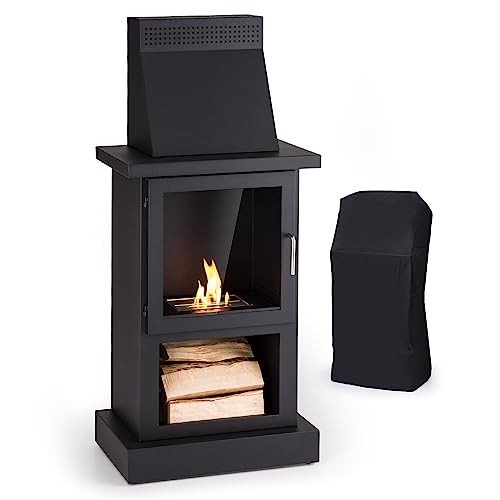Fireplaces in the UK: A Comprehensive Guide
Fireplaces have actually long been an essential part of British homes, providing both aesthetic charm and functional warmth. As the weather condition turns cold, the appeal of a cozy fire beckons, changing any living space into a sanctuary. In this post, we will explore the numerous kinds of fireplaces available in the UK, considerations for setup, maintenance pointers, and responses to often asked concerns about fireplaces.
Kinds of Fireplaces
When selecting a fireplace for a UK home, numerous alternatives are offered, each with unique features and advantages. The following table sums up the main kinds of fireplaces popular in the UK:
| Fireplace Type | Description | Pros | Cons |
|---|---|---|---|
| Open Hearth | Traditional fireplaces that burn wood or coal, offering a rustic feel. | Genuine ambiance; excellent heat circulation | Less energy-efficient; requires chimney upkeep |
| Gas Fireplaces | Usage natural gas or propane; can be direct vent or ventless. | Immediate heat; simple to run; cleaner burning | Initial installation expense; may require gas line |
| Electric Fireplaces | Mimic a flame using LED lights and provide heat through electrical energy. | Safe; easy to set up; no flue needed | Less genuine; higher operating expense |
| Wood-burning Stoves | Closed-system fireplaces that burn logs, using high performance. | High heat output; eco-friendly when utilizing sustainable wood | Restricted aesthetic compared to open hearth |
| Bioethanol Fireplaces | Environment-friendly option that burns bioethanol, producing real flames. | No chimney required; versatile style alternatives | Can be costly to operate; minimal heat output |
Benefits and drawbacks of Each Type
Open Hearth
- Pros:
- Provides character to any home.
- Effective heat circulation due to open flames.
- Cons:
- Less energy-efficient and more smoke than modern options.
- Needs regular cleaning and upkeep of the chimney.
Gas Fireplaces
- Pros:
- Easy to control and run with the flick of a switch.
- Cleaner option with less soot accumulation.
- Cons:
- Requires a gas supply and installation costs can be high.
- May not offer the exact same ambiance as a traditional fire.
Electric Fireplaces
- Pros:
- Simple setup without any chimney or flue needed.
- Comes in numerous designs, looking like traditional options.
- Cons:
- Lacks the realism of real flames and can become costly with continuous use.
Wood-burning Stoves
- Pros:
- Highly efficient and produces significant warmth.
- Eco-friendly resource when utilizing properly sourced wood.
- Cons:
- Requires extra space for log storage and routine upkeep.
Bioethanol Fireplaces
- Pros:
- Flexible positioning due to no need for traditional venting.
- Clean-burning and very little impact on indoor air quality.
- Cons:
- Can be less cost-effective for continual usage compared to gas or wood.
- Heat output is less efficient for larger areas.
Setup Considerations
When installing a fireplace in a UK home, a number of factors should be taken into account:
- Building Regulations: Ensure compliance with regional building codes and security guidelines.
- Chimney and Flue: Determine the requirement for a chimney or flue system based upon the kind of fireplace selected.
- Ventilation: Proper ventilation is vital for security, particularly with gas, wood, and bioethanol options.
- Place: Consider the best place for the fireplace to take full advantage of heat circulation and visual appeal.
- Expert Help: Engaging a professional installer can ensure a safe and accurate setup customized to the specific kind of fireplace.
Upkeep Tips
Regular maintenance of a fireplace is necessary for both safety and efficiency. Follow these guidelines to keep your fireplace in peak condition:
- Chimney Sweeping: Have your chimney expertly swept a minimum of as soon as a year to avoid blockages and lower fire threat.
- Examine for Damage: Regularly examine for leakages, fractures, or damage, particularly in gas and wood-burning fireplaces.
- Tidy the Surroundings: Ensure the location around the fireplace is devoid of dust and combustible materials.
- Examine Carbon Monoxide Detectors: Test detectors frequently, specifically in homes with gas-burning appliances.
- Shop Wood Properly: If using a wood-burning range, shop wood in a dry location to reduce wetness content.
Frequently Asked Questions
What is the best type of fireplace for a small room?
For small spaces, electric fireplaces or bioethanol models are frequently suggested due to their smaller size, safety features, and looks.
Are electric fireplaces cheaper to run than gas?
Electric fireplaces generally have a lower upfront expense, however depending upon electrical energy rates, they can be more costly to operate long term compared to gas.
Do wood-burning stoves need a great deal of maintenance?
While they do need some maintenance, such as cleaning and regular chimney sweeper, lots of property owners find that modern wood-burning stoves are efficient and fairly low upkeep compared to traditional open hearths.
Can I set up a gas fireplace myself?
While some property owners might try DIY installation, it is highly suggested to hire an expert for gas fireplace setups due to safety issues and regulatory compliance.
How can I maximize the heat output of my fireplace?
To make the most of heat output from any fireplace, think about the following:
- Keep windows and doors closed throughout use.
- Use heat-efficient logs or fuels.
- Guarantee proper airflow around the fire.
- Use fans or blowers that can flow warm air throughout the space.
Fireplaces stay a cherished aspect within UK homes, providing heat, beauty, and a welcoming environment. Provided Best Fireplace of options and their special functions, homeowners can choose the best fireplace to complement their living space while making sure security and efficiency. With routine maintenance and a clear understanding of the installation requirements, anybody can take pleasure in the appeal and convenience of a fireplace for years to come.

